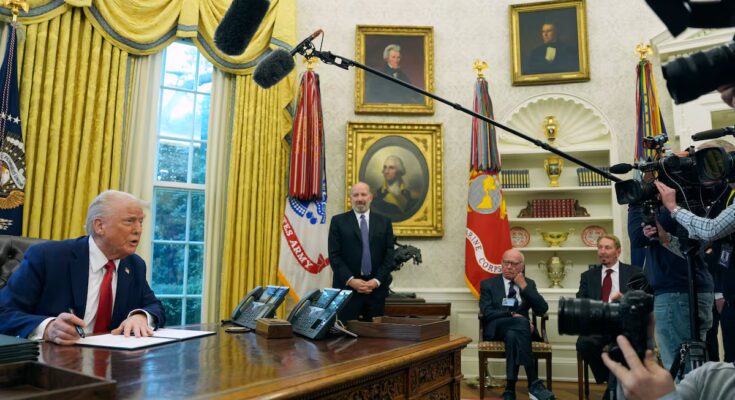This article is an excerpt from news weekly The choice of the director of Cinco Días, every Thursday in your inbox. You can sign up at this link.
The new populist right, on the rise across the planet and in power in the White House, is becoming less and less liberal. If in previous decades there was talk of neoliberalism, and even ultraliberalism, today we must note that it is the illiberal right that prevails, since it has been described as one that despises the classical principles formulated by David Ricardo, John Locke or Adam Smith and that shows authoritarian instincts. This new right does not entrust everything to the free market as the manual said, even if it prefers to deregulate and lower taxes, because it intervenes decisively in the economy and (even worse) in businesses; even (much worse) in the media. As if the state capitalism (spiced with fierce censorship) that the China we called communist has become is the global model for the 21st century. Now the strong man takes over, while the strong state returns, none of this laissez-faire.
Donald Trump is the great protagonist of this turning point. In a country not accustomed to state participation in companies, the US government has entered into the capital of Intel (for chips) and Lithium Americas (for rare minerals), and has made it known that it is considering doing so with Lockheed Martin (armaments), Boeing (aircraft) or Westinghouse (nuclear). But Trump also instructed specific technology or consumer product companies, such as Apple, pharmaceutical companies or Walmart, to produce here and there or to keep prices down. Of course, Washington is moving forward with deregulation of anything related to the environment or union rights. This is why it is ultra-liberal.
The days of privatization inspired by the conservative revolution of Thatcher and Reagan in the 1980s are long gone. Of course, these processes could contain a trap: in the Spain of Aznar’s time, the last public companies (Telefónica, Endesa, Repsol) were privatized, but thereafter the government continued to appoint its presidents and lead their management. Now another Spanish executive, through SEPI, has returned to the capital of Telefónica (and fired its president, Álvarez-Pallete, summoning him to La Moncloa) and has entered those of Indra or Talgo; He also created the so-called digital SEPI to inject money into tech firms. There are more examples in the world, on the right and on the left, because global disorder, the experience of the pandemic and threats of war have led states to strengthen direct or indirect control of strategic companies. It is understandable if the interest is that of national security.
But let’s get back to what is happening in the almost unrecognizable United States. Trump’s greatest contradiction with liberalism lies in his push to impose tariffs, shifting and unstable, that are triggered or cut from one day to the next. He was very angry at Canada because the Ontario provincial government had used Reagan’s image in an advertisement, as the popular US president in the 1980s was a staunch free marketeer. Trump exploded against the ad, calling it “impostor“, and Canada had to apologize. The truth is, Reagan said things like this: “We must beware of demagogues who are willing to wage a trade war against our friends, weakening our economy, our national security and the entire free world.” This was liberal.
And Trump also tried to undermine one of the principles of modern capitalism: the independence of central banks. His desire to run the Federal Reserve as he wants has suffered a setback in the judiciary, which keeps governor Lisa Cook in her place for now, while the president launches an unprecedented attack on Fed Chairman Jerome Powell, the target of a torrent of insults (“stubborn mule”, “total idiot”, “airhead”…). Central bank independence is not a taboo, but rather a key to market confidence: a government that manages interest rates according to its own political interests and outside of technical criteria can lead to disaster. This battle is not over and could be devastating to the credibility of the US economy.
At the same time, be careful, Trumpism has its hands (with or without consent) on the media. With different means, including a shower of billion-dollar defamation lawsuits that try to intimidate them: this is what has been done against The New York Times, the Wall Street Journal or Paramount (whose merger with SkyDance was approved only after a deal to compensate Trump and the firing of comedian Stephen Colbert). No, not even comedians are spared: let’s remember the cancellation, rudely requested by the president of the communications regulator FCC, of the Jimmy Kimmel show, which sparked such controversy that ABC ended up backing down.
This led to the right of very prominent newspapers and media groups after operations inspired by the White House and carried out through like-minded businessmen, such as Larry Ellison, the billionaire owner of Oracle, and his son David. Journalist and media expert Jeff Jarvis explains it this way: “Larry and David Ellison are becoming mini-Murdochs, media moguls who take control of CBS and install right-wing management there, and will probably soon take control of CNN, along with TikTok.” It’s not just the media, of course: it’s the (now most influential) social media platforms like the aforementioned X or Facebook that fall into the web of far-right interests.
Trump’s campaign to control or destabilize media critical of him doesn’t even stop at his borders. This week the British BBC, which despite the numerous crises it has experienced, continues to be a point of reference for professionalism, suffered a disproportionate attack from Washington for a recognized and recognizable error, which led to the resignation of the network’s director general, Tim Davie, and the head of News, Deborah Turness. What was considered unforgivable is the following: a documentary about Donald Trump (from the production company October Films) broadcast before his re-election excerpted parts of his speech on January 6, 2021, when he encouraged his followers to march on the Capitol in what ended with a violent assault on the temple of democracy, in a kind of coup attempt. The editing made one believe that two sentences by the then outgoing president were uttered at the same time, and not in separate parts of the same speech. It was bad practice, sure. But the context didn’t change much in that sequence: In fact, Trump encouraged his followers to “fight like hell.” (fight like hell!) on Capitol Hill against the election of Joe Biden, who was the winner at the polls at the time.
That the attempt to force the media into the White House has crossed the Atlantic Ocean and reached a symbol of good press in Europe is more than disturbing news. Not just for journalists: also (above all) for citizens, holders of the right to information, those who must be able to know the truth even if those in power don’t like it.
«It was true that that night Trump encouraged the insurrection to the point of infamy, just as it was true that Reagan hated tariffs. And it is that liberalism is going through a difficult time.
Every Thursday, The choice of the director of Cinco Días, with commentary from Ricardo de Querol and links to the week’s top business stories. Sign up here.



